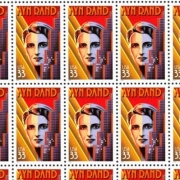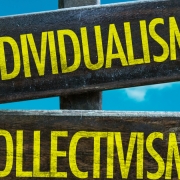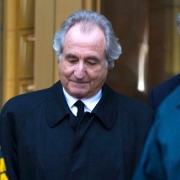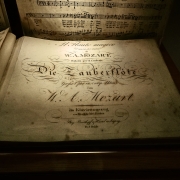A deserving explanation of Ayn Rand’s system of ideas must begin with Ms. Rand’s own words. It is “a philosophy for living on earth.” This statement is so broad and powerful it’s almost ironic, what other kind of philosophy could there be? That’s the idea. Confidence rooted in moral principles.
Each part of the sentence is broad and powerful in its own right. Philosophy is the most abstract of thinking disciplines. Living lives of reason, purpose and pride is the root of happiness. And earth, from the particles of matter to the energy of quasars, is the knowable domain of existence. This is why Rand’s philosophy is called Objectivism. It is rooted in empirical evidence – observable and repeatable facts subject to rigorous analysis. In other words, reality. It exists. Nothing supersedes nature. Aristotle’s Law of Identity prevails.
This introduction will cover four integrated concepts. This is central to Ayn Rand’s system, the integration of ideas into a logical hierarchy. If we imagine concentric circles, reality is at the center, then reason perceives and understands it, self-interest surrounds that and guides rational behavior, and capitalism is the moral code for social interaction. Here, we will examine these four concepts using the compelling opening sentences of Rand’s four novels.
Reality
“Petrograd smelt of carbolic acid” begins the opening sequence of Ayn Rand’s 1936 novel, We the Living. Also known as phenol, its a strong disinfectant for lice-borne disease, which is the predictable squalor induced by Communism. Set in 1920s Soviet Russia, Rand’s first major literary work is also her most personal. Before escaping Russia, Rand witnessed the first shots of the Bolshevik Revolution in 1917 St. Petersburg.
We the Living was Rand’s plea to the West about this atrocity, to no effect. According to philosophy professor Dr. Michael Berliner, “The city is in chaos and its citizens are starving, terrorized, hopeless, hostile and helpless against the police power of the Communist government.” However, this is not a novel about Russia, its about the sanctity of human life versus soul-crushing collectivism. We the Living is the story of a young woman filled with optimism and talent. Kira confidently faces the reality of Red propaganda, deplorable conditions, neighborhood spies, shrugs them off, and pursues her life’s values, as it should be.
Reason
“Its a sin to write this” is also a broad and powerful statement. This first sentence is the premise of Ayn Rand’s 1937 dystopian novella Anthem, whose Unspeakable Word is “I.” The writer is declaring that religion dominates the culture, there are sanctions for independent Knowledge, and these acts require permission. The reader can infer the writer is alone, which is also forbidden.
Written during the formation of her next and more elaborate work of fiction, Anthem explains the root cause of Soviet terror, and heralds Reason’s victory over collectivism’s cowardice. As literature professor Dr. Stephen Cox explains, “For Ayn Rand, words were always the primary means of understanding the world and the self. Appropriately, Anthem’s story of self-discovery starts and ends with the written word.” In Anthem, Rand’s use of satire is on full display, “Should it be what they claim of it, then it would bring ruin to the Department of Candles. This would wreck the Plans of the World Council!”
Self-Interest
“Howard Roark laughed” is the launching pad of Ayn Rand’s first best-selling novel, The Fountainhead. It evokes questions like, why is he laughing? What is he laughing at? Who is Howard Roark? As philosophy professor Dr. Robert Mayhew tells us, “Roark is laughing at his dismissal from architecture school.” Like Kira’s character, he also laughs “because to him these obstacles seem small and inconsequential relative to his prospects for achievement and joy.”
Self-interest is a controversial term, and the reason why Rand titled one of her nonfiction books The Virtue of Selfishness. The Fountainhead’s moral exemplar is embodied in the character of Howard Roark. At his trial, and speaking in his own legal, and America’s moral defense, Roark asserts “Our country was based on a man’s right to the pursuit of happiness. His own happiness. Not anyone else’s. A private, personal, selfish motive. Civilization is the process of setting man free from men.” Rational egoism is the principle for living that is proven by Objectivism’s Ethics.
Capitalism
“Who is John Galt?” This is the iconic leading question of Ms. Rand’s magnum opus Atlas Shrugged. It was voted by an online poll of readers, conducted by Modern Library in 1999, as the most influential novel of the 20th century. Considered Rand’s signature achievement, it also inspires the greatest number of advocates and detractors. Essentially, Atlas is about the role of the mind in human existence. So who is this guy?
Galt is the ultimate man of the mind, and the character who executes a fascinating, uniquely Randian, literary device. What happens to the world if the men of the mind go on strike? Galt is also the owner of the motor of the world, both literally and figuratively. He invented a motor that runs on a limitless supply of ambient static electricity, one the world badly needs, yet he’s also the metaphor for the real motors. In Atlas, they are the American industrialists and employees who create value and trade freely for their own earned profit. They embody the ideals of productiveness necessary for human flourishing.
Its Exists, It is Real, It is Possible, It’s Yours.
We have touched on the four major themes of Ayn Rand’s philosophy by using the opening sentences of her four novels. Hopefully, it was interesting and useful. The mission of this series is to expand on these core concepts using examples from Ayn Rand’s fictional characters, nonfiction, and contemporary life. The scope of her ideas is vast, so each post will focus on fundamentals, and be short enough to digest in small bites. Just as Kira, Roark and Galt confidently faced reality in their fictional worlds, readers can smile and face the collectivist dogma that dominates our postmodern culture with reason, purpose and pride.













